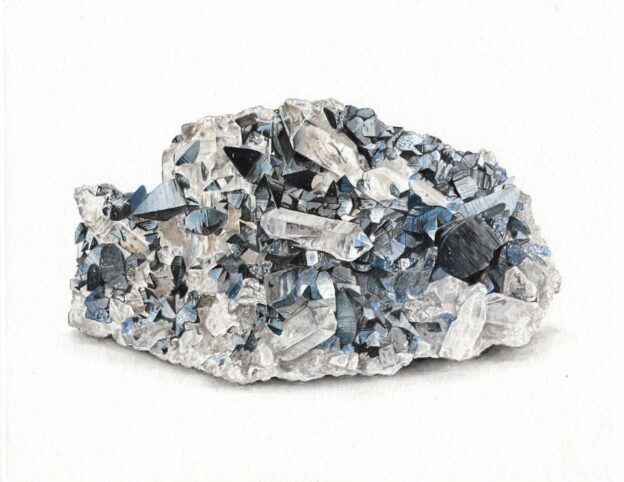The person, who first saw the layered blue anatase, hardly believes in the natural origin of the stone. The voluminous rhombus, beautifully outlined by the transverse planes of gentle pastel shades, gives the impression of a man-made product.
However, colorless (more precisely, almost colorless: the minimum color of the stone is still present) is even more beautiful anatase. Even without being faceted, this gem sparkles and shimmers with all the colors of the rainbow, not surpassing, but approaching in beauty to a diamond.
Incidentally, it was the amazing optical properties of anatase that inspired scientists to create artificial jewelry – cubic zirconia – which is a synthetic analogue of a natural mineral.
Physical properties of anatase
In the chemical aspect, anatase is titanium dioxide TiO2. Crystallization of oxidized titanium under various conditions gives as many as three minerals – related to each other, but still different. The usual natural form of titanium oxide is rutile and brookite. Anatase, which differs from mineral counterparts in the form of crystals, is less common in deposits.
The difference in the crystalline “packing” of atoms generally changes the light transmission of a substance. This is why anatase happens to be blue, while rutile is reddish and brookite is brown.
The anatase crystalform is the dipyramidal octahedron. Renee Just Gayui, who examined the stone in 1801, found such a form worthy of perpetuation, and gave the mineral a modern name. “Anatasis”, translated from ancient Greek, means “elongated, oblong.”
Beautiful anatase is rare
Among the masters of the processing of semi-precious stone, it became customary to call anatase a stone of blue tones of varying degrees of transparency and uniformity. In mineralogical collections, crystals that are opaque to complete blackness and translucent anatases of cold greenish, as well as warm reddish-brown shades are used.
The natural size of crystalline anatase usually does not exceed ten millimeters. Large specimens of rhomboid anatase are especially valued by buyers. The smooth edges of the stone shine very much, but anatase crystals often have defects: cracks, inclusions, formation defects.
In the Swiss Alps, quite large anatases of a beautiful yellow tone are found. In Poland, near the border with the Czech Republic, anatases 5-6 cm in size are found. Each mountainous country in the world boasts its own anatases – but almost no anatases are suitable for jewelry processing.
Anataz: a stone far from jewelry quality
Bright shine and pronounced dispersion are characteristic of transparent anatases. In deposits, such stones are found in single quantities, and they are small in size. Theoretically, after cutting from natural slightly colored anatase, an insert of no more than one or two carats can be obtained.
Moreover! There are rumors in the jewelry environment that someone has personally seen faceted anatases of excellent quality weighing six carats – however, these legends do not find clear evidence. It is only known that anatase crystal suppliers of the best collection quality collect semiprecious stones in diamond placers of Yakutia and Brazil. Collectible – but not jewelry!
Beautifully colored dipyramidal (rhomboid) anatases become an expensive commodity. However, the attempts of amateur masters to adapt the frame and suspension to the stone end with the destruction of anatase.

